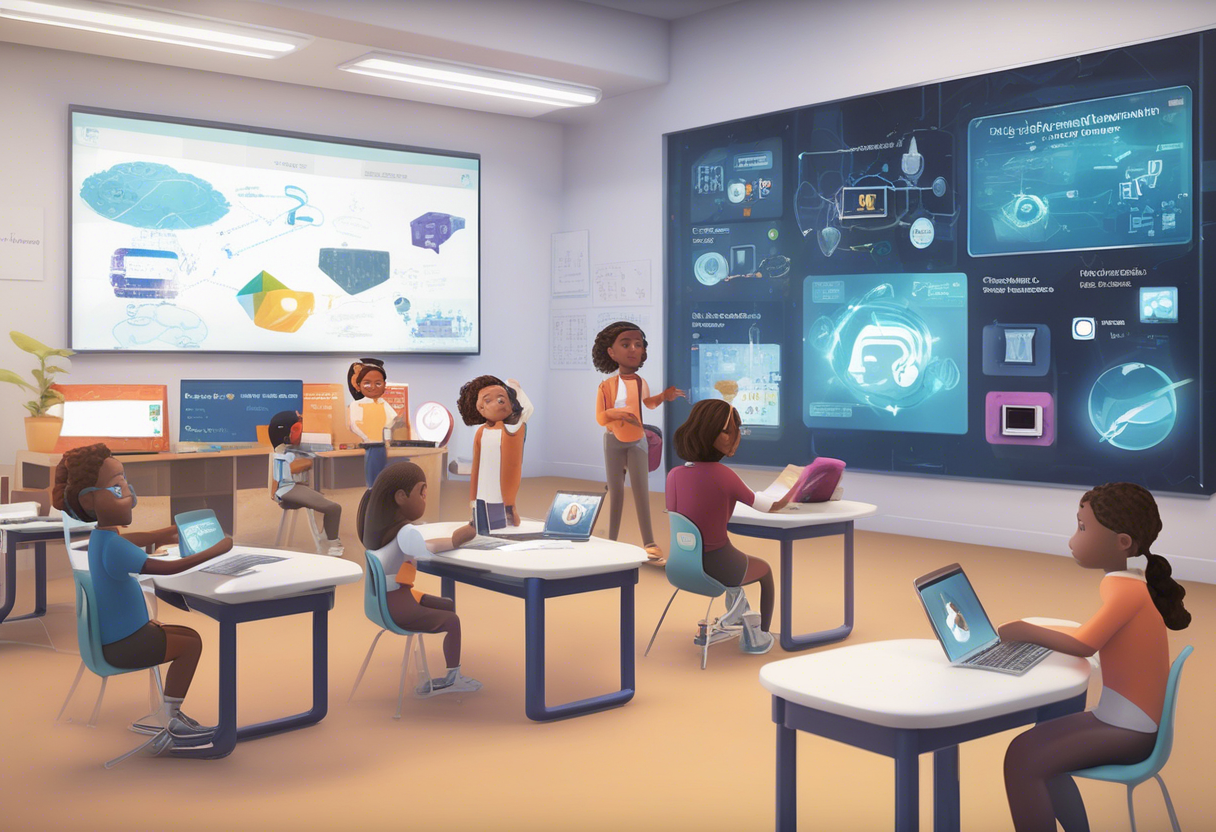In our fast-moving digital age, the old one-size-fits-all way of learning is fading away. Now, we have personalized learning paths, changing how we view education. A recent study shows that students in personalized learning are 30% more likely to reach their goals. That's where Artificial Intelligence (AI) comes in. Picture AI algorithms adjusting educational content to match each student's needs, preferences, and pace. It's like having your own tutor, always ready to help you on your learning journey. In this article, we'll explore how AI is shaping these personalized experiences and answer your questions. Whether you're a teacher, a student, or just curious about where education is heading, you're in the right spot to learn about AI and personalized learning!
Summary: Dieser Artikel beschreibt die Rolle von KI in der Gestaltung personalisierter Lernpfade und beantwortet häufig gestellte Fragen zu diesem Thema.
AI's Role in Personalized Learning Paths
What Are Personalized Learning Paths?
Personalized learning paths are all about tailoring education to fit each student's unique style, pace, and preferences. Unlike the one-size-fits-all approach of traditional schools, personalized learning recognizes that every student is different. This way, no one gets stuck in a rigid system. Instead, students get a more personalized and effective learning experience.
At the heart of personalized learning is the focus on the student, not just the curriculum. This approach lets students take control of their learning, encouraging them to learn on their own and grow personally. There are many ways to do this, such as:
- Letting students progress based on what they know
- Exploring topics they're interested in
- Using adaptive technology
By leveraging data on student performance and preferences, teachers can create engaging learning environments tailored to each student's style.
These learning paths often mix different teaching methods and technology, like online courses, simulations, projects, and real-world tasks. This variety not only helps students excel academically but also fosters a love for learning. Students can move quickly through familiar content and receive support where they struggle, making learning more tailored to their needs.
How AI Shapes Education
AI is a significant enabler of personalized learning. It can sift through vast amounts of data to identify trends and insights that shape personalized learning paths, helping teachers understand student needs and adjust their teaching accordingly.
AI transforms education by automating tasks like grading and progress tracking, allowing teachers more time to engage with students, thereby enriching the learning experience. Additionally, AI provides teachers with insights to fine-tune their teaching strategies, ensuring lessons align with each student's needs.
AI-driven systems adjust the difficulty and type of content based on student performance, keeping learners challenged at the right level, which aids comprehension and retention. AI also offers real-time feedback and support, with smart tutoring systems ready to assist when students encounter difficulties. This immediate feedback keeps students on track and clarifies misunderstandings before they become entrenched.
AI also helps create learning environments that evolve with the student. By continuously analyzing student interactions and outcomes, AI can refine and improve learning paths over time. This adaptability is crucial for maintaining the effectiveness of personalized learning paths as students progress.
AI-Powered Platforms Revolutionizing Education
Several AI-powered platforms are making personalized learning a reality by offering solutions that meet the needs of both learners and teachers. These platforms gather data from various sources to create custom learning environments.
Platforms like DreamBox Learning and Khan Academy are at the forefront of adaptive learning technology. DreamBox is an online math program that uses AI to deliver personalized lessons for students from kindergarten to eighth grade, adapting in real-time to student inputs. Similarly, Khan Academy employs AI to adjust lessons based on student performance, keeping them engaged and challenged.
Innovative systems like Smart Sparrow and Knewton personalize content based on learning patterns. By analyzing data from millions of students, these AI systems identify the best strategies for each student, allowing teachers to provide a tailored learning experience.
Squirrel AI Learning, a Chinese edtech company, utilizes AI for personalized tutoring. Its algorithms assess student performance and behaviors to create custom learning paths, predicting outcomes and identifying areas needing more support, ensuring each student receives the right level of challenge and instruction.
Boosting Academic Success with AI
AI-powered personalized learning paths can enhance academic performance and skill development by tailoring lessons to individual needs, helping students excel and develop skills necessary for future success.
One significant advantage of personalized learning paths is their ability to address learning gaps and misconceptions. AI can identify areas where students struggle and offer targeted support, helping students build a strong foundation of knowledge and skills, leading to improved performance.
AI platforms also provide personalized feedback and recommendations, boosting student engagement and outcomes. By catering to individual needs, AI enables students to learn at their own pace, deepening their understanding. Research indicates that AI-driven personalized learning can significantly enhance performance and engagement, making it a valuable educational tool.

These paths also promote critical thinking and problem-solving skills by engaging students in meaningful experiences that encourage applying knowledge in real-world contexts. This hands-on approach not only reinforces academic concepts but also builds essential life skills.
Furthermore, personalized learning paths support self-directed learning. By allowing students to control their learning journey, these paths encourage goal-setting, progress monitoring, and reflection, fostering the autonomy and confidence needed to succeed in a rapidly changing world.
Driving Student Engagement and Motivation with AI
Engagement and motivation are key to successful learning. AI-powered personalized learning paths enhance these by creating engaging and relevant experiences that resonate with students.
AI tailors content to individual interests and speeds, improving engagement. By aligning content with students' passions and goals, personalized paths make learning more relevant and meaningful, boosting motivation and encouraging students to take charge of their learning.
A McKinsey study found that personalized learning can boost engagement by up to 50%. By providing content that matches individual needs and pace, AI platforms increase motivation and learning effectiveness. This approach not only captures attention but also encourages persistence.
Personalized paths also incorporate gamification elements, like points and badges, to make learning fun and interactive. This not only captures attention but also encourages students to persevere.
AI-powered paths offer opportunities for social interaction and collaboration. Many platforms allow students to work together, share ideas, and provide feedback, fostering a sense of community and deeper engagement with the material.
Navigating Challenges and Ethics in AI Learning
While AI-powered personalized paths offer numerous benefits, they also present challenges and ethical concerns. One challenge is ensuring all students have access to these tools, as not everyone has the same access to technology. It's crucial to address these disparities to ensure all students can benefit from personalized learning.
Ethically, data privacy and avoiding bias are paramount. AI relies on vast amounts of data, raising privacy concerns. Schools and tech providers must protect student information.
Algorithmic bias is another challenge. AI is only as good as the data it's trained on, and biased data can lead to biased outcomes. It's essential to ensure AI algorithms are transparent and regularly audited to prevent discrimination and ensure fairness.
Addressing these challenges requires ongoing research and collaboration to ensure AI benefits all learners equitably. Educators, tech providers, and policymakers must work together to create an educational ecosystem that leverages AI to support all students.
Future Innovations in AI-Personalized Learning
The future of AI-powered personalized learning holds exciting possibilities and innovations that could further transform education. Future AI assistants might function as personal coaches, guiding students through their learning paths. These AI coaches will provide individualized instruction and feedback, enhancing education quality and motivation.
Advancements in AI will continue to enhance personalized learning by integrating technologies like natural language processing and predictive analytics. These will enable more interactive and responsive experiences, allowing students to engage with virtual instructors.
AI will help develop more adaptive and responsive educational systems. By continuously analyzing data, AI systems can refine learning paths over time, ensuring they remain relevant and effective.
Integrating virtual and augmented reality into personalized paths offers immersive experiences that engage students in new ways. By incorporating VR/AR, educators can provide hands-on experiences that enhance understanding and retention.
The future of AI-powered personalized learning will likely involve more collaboration between educators, tech providers, and policymakers. By working together, they can create a more cohesive and effective educational ecosystem that leverages AI to support all students.
FAQs
How Does AI Enhance Personalized Learning and Boost Student Engagement?
AI enhances student engagement and motivation by personalizing the learning experience. With AI, learning paths are tailored to each student's role, skill level, and career aspirations. This customization makes content more relevant, sparking interest and maintaining engagement. For instance, AT&T's use of data analytics led to a 92% increase in employee engagement, illustrating AI's motivational power through personalization.

Adaptive learning systems further this personalization. They assess student performance and suggest subsequent modules based on past achievements and interests. This method ensures students are consistently challenged without feeling overwhelmed, keeping the learning experience engaging.
Personalized learning paths also play a crucial role in reducing dropout rates. By aligning educational content with students' interests, these paths motivate students to persist in their studies. Evidence supports the effectiveness of these paths in making learning more relevant and tailored to individual needs.
What Challenges Exist in Implementing AI for Personalized Learning Paths?
Integrating AI into education presents several challenges. A significant one is aligning personalized learning paths with curriculum standards while accommodating diverse student abilities. This requires balancing standardized goals with individualized experiences.
Data privacy is another major concern. AI systems track student progress, raising questions about data collection, storage, and use. Compliance with regulations like the GDPR is essential to protect student privacy.
Educators also face hurdles in adopting new AI tools. Effective use of these tools requires training, which can be resource-intensive. Schools often need to invest in Learning Management Systems (LMS) and train staff, demanding both time and money.
Additionally, AI systems can perpetuate bias if trained on biased data, leading to unfair treatment based on race, gender, or socioeconomic status. Regular checks and updates are necessary to ensure AI remains fair and unbiased.
How Can AI-Driven Personalized Learning Paths Reduce Dropout Rates?
AI-driven personalized learning reduces dropout rates by catering to individual learner needs and interests. By tailoring content to each learner's goals, these paths maintain student engagement and decrease dropout likelihood. Relevant material is key to sustaining motivation.

Real-time feedback and ongoing assessments powered by AI also contribute. They enable quick adjustments to learning paths, addressing challenges before they lead to disengagement. Immediate feedback helps learners understand and learn from mistakes, fostering a supportive environment.
Personalized learning allows students to progress at their own pace, focusing on skills they find most relevant. This flexibility reduces frustration and enhances retention. A study by WorkSmart found that individualized programs increased engagement by 40% and reduced attrition rates by 25%.
AI can also identify at-risk students early by analyzing data like attendance and grades. Predictive tools flag potential dropouts, enabling educators to provide targeted support. This personalized attention helps ensure students stay on track and complete their education.
In summary, AI-driven personalized learning paths improve engagement, address integration challenges, and lower dropout rates. By tailoring education to individual needs, schools can create a more engaging and effective learning environment for everyone.
Explore more about personalized learning paths and adaptive learning systems to see how AI can shape the future of education.